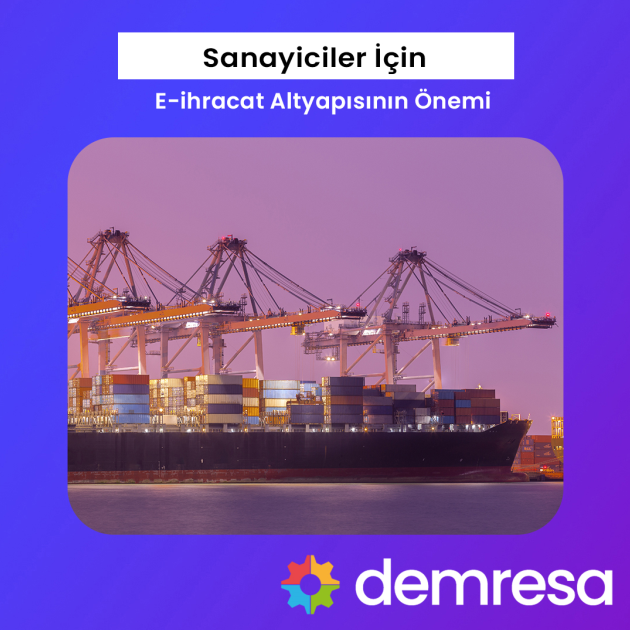
Digitalization: A New Era in E-Export
For manufacturers and exporters, e-export is no longer an option but a necessity in global competition. In Turkey, the volume of e-export increased by 27% in 2024, reaching 6.4 billion dollars. Although this amount represents only 2.6% of total goods exports, it is growing rapidly.
With public supports and incentives, it is targeted that the share of e-export in total exports will rise to 10% by 2028. This transformation inevitably pushes traditional manufacturers and industrial companies towards digital channels. Thousands of companies have set up digital stores and started selling online to customers all over the world.
Manufacturers are moving their production power online and seeking ways to access wider markets. Digitalization is not limited to just launching a website. Choosing the right infrastructure, effectively showcasing products, smoothly processing orders, and providing a seamless experience to customers in different countries are all part of this process.
Especially in industrial products, technical knowledge and trust are very important. Potential customers want to see detailed information about the product in their own languages, clearly and understandably. At the same time, offering an easy ordering experience via mobile devices without being tied to desktop computers is crucial. Therefore, multilingual and mobile-compatible infrastructures have become essential for digitalizing manufacturers.
The Power of Multilingual Sales for Global Competition
When your target market as a manufacturer crosses country borders, your digital presence must also be borderless. Multilingual sales is the key to reaching global customers. Research shows that 73% of consumers prefer to buy products or services from a site that provides information in their own language.
Moreover, 60% of users avoid shopping from sites offering only a single language. This clearly demonstrates that providing multilingual content directly impacts sales. Multilingual infrastructures allow customization of language, currency, and payment methods tailored to different markets.
A customer in Germany wants to read product information in German, while a customer in the Middle East wants to see content in Arabic. Especially for technical products, explanations in the local language build trust. Additionally, when product documents or user manuals are presented according to the target market, they positively affect purchasing decisions.
Different currency and payment options that come with multilingual support make shopping easier for overseas customers. This establishes a bond of trust at the very first interaction and provides a competitive advantage in international markets.
Mobile Compatible Infrastructure and 24/7 Access
Mobile devices have now become central to shopping habits. With the widespread use of smartphones, people conduct product research and make purchases via mobile devices in all fields including B2B. In Turkey, 71.3% of e-commerce orders in 2023 were made via mobile devices. One year earlier, this rate was 62%. This increase shows how fast mobile commerce is growing.
Globally, two-thirds of online transactions are done on mobile devices. Therefore, mobile compatibility is an undisputed necessity for companies aiming to succeed in e-export. Your site must work flawlessly on different screen sizes, load quickly, and be user-friendly.
Customers might examine products on desktop but place orders at home via phone. If your site is slow or incompatible on mobile, it means lost sales. Additionally, overseas customers want 24/7 access across different time zones. Search engines like Google prioritize mobile-friendly sites, which increases visibility.
Traditional perceptions are changing; now an engineer or a manager can comfortably shop from their mobile phone. Therefore, it is crucial that all functions work flawlessly on mobile devices.
Powerful Solutions with Modern Infrastructure
Modern infrastructures that provide all the necessary features for success in e-export under one roof make the digitalization journey easier for companies. These solutions are developed by analyzing manufacturers' needs and contribute to businesses being effective on the global stage.
Unlimited Multilingual Support: Thanks to your infrastructure, you can translate your site into as many languages as you want and automatically display languages according to the visitor’s country. This location-based structure offers a seamless and personalized experience. For example, a user from Germany sees content in German, while a user from France sees content in French.
Mobile Compatible Design: The entire infrastructure is designed to be mobile compatible. Users accessing from computers or phones encounter a fast and smooth interface. Page loads quickly and the design automatically adapts to all device screens.
Easy-to-Use Management Panel: Regardless of technical skill level, all users can easily manage the site. Adding products, tracking stock, updating prices are done through a simple and clear interface. Thousands of products can be uploaded at once and bulk edits can be made.
International Integrations: For companies targeting global sales, the infrastructure supports ready-made currency options, cargo and logistics integrations, connections to international marketplaces, and various payment methods. This allows companies to focus directly on sales without additional development needs.
Remove Boundaries in the Digital World
A multilingual and mobile-compatible e-commerce infrastructure has become not only a choice but a strategic necessity for companies in today’s competitive environment. Thanks to digitalization, geographical borders have ceased to be a physical barrier, and brands have the potential to reach customers worldwide.
In this new digital era, companies offering products or services must think globally, not just locally, and operate with technological infrastructures suited for this. For businesses offering industrial and technical products, providing clear and reliable information in customers’ native languages makes a big difference.
When choosing infrastructure, language support and mobile compatibility should be considered as two fundamental criteria. Multilingual systems do not only provide translations but also offer a customer experience that considers cultural differences. Users can see content in their own currencies and interfaces structured according to their habits.
Moreover, a mobile-compatible infrastructure allows visitors to access the site seamlessly from desktops or mobile devices. Since many purchasing decisions today are made after initial reviews on mobile devices, mobile performance directly affects the path to sale.
